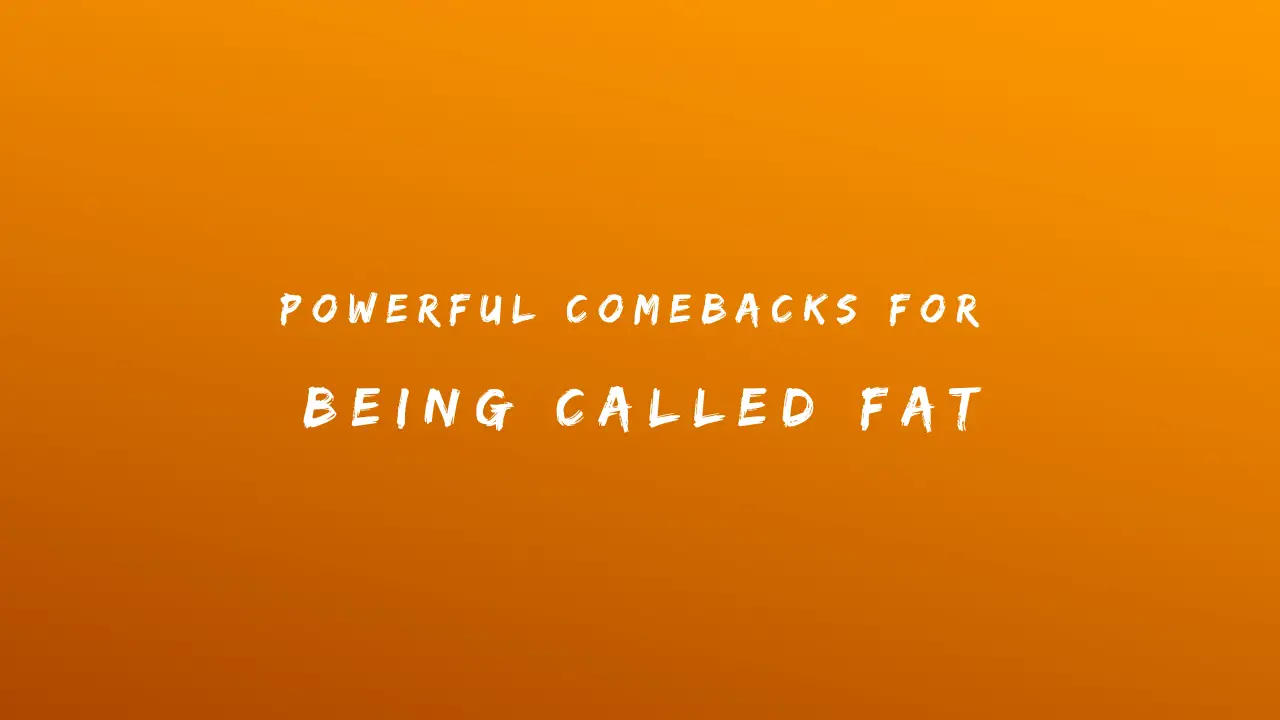Being called fat can sting deeply, cutting through your self-esteem like a knife. It’s more than just an insult; it reflects societal standards and personal insecurities. The emotional impact of such comments can range from hurtful to damaging, affecting how we see ourselves and interact with others.
Why Do People Resort to Insults?
- Psychological Reasons Behind Insults
People often hurl insults as a way to cope with their insecurities. When someone calls you fat, it might be a projection of their self-doubt or discomfort with their body. Additionally, societal and cultural pressures can shape such behaviours, as we are often bombarded with unrealistic beauty standards.
- The Role of Body Image in Insults
Media and cultural norms heavily influence how people perceive body image. From magazine covers to social media influencers, the emphasis on a certain body type can make those who don’t fit the mould feel less valuable. This societal pressure can contribute to the hurtful comments you might receive.

150+ Comebacks for Being Called Fat
Confidence Boosters
- I’m proud of who I am and what I’ve achieved, and that’s what truly matters.
- Confidence comes from within, and I’m confident in my skin.
- My size doesn’t determine my worth; my character determines it.
- I love myself for who I am, which will not change based on someone else’s opinion.
- I’m comfortable with myself, and that’s something you can’t take away from me.
- You don’t need to agree with me to respect me.
- I’m more than just a number on a scale; I’m a whole person with talents and dreams.
- Your opinion doesn’t define my self-worth.
- I have a strong sense of self, which matters most.
- Confidence is about knowing your value and not letting others dictate it.
Humour and Wit
- I’m not fat; I’m just more fun-sized!
- I guess I’m on the ‘larger-than-life’ plan.
- I’m not big; I’m just more to love.
- I like to think of it as having extra ‘personality’.
- I’m not fat; I’m just easier to see!
- I have a bigger heart and smile—more to share with the world.
- I’m not overweight; I’m just under-tall.
- You must be confusing me with a teddy bear—lots of fluff and very huggable.
- I’m like a deluxe model; more features to enjoy!
- I guess I’m just more ‘impressive’ in all dimensions!
Health and Wellness
- Health is about how you feel, and I’m feeling great.
- Being healthy is more than just numbers on a scale; it’s about how I treat my body.
- I focus on being active and feeling good rather than just looking a certain way.
- I’m committed to my well-being, and that’s what matters most.
- My health is a priority, and I’m doing what I need to care for myself.
- I’m more concerned with my health than fitting into someone else’s idea of beauty.
- True wellness is about balance and self-care, not just appearance.
- I’m strong and healthy, and that’s what I focus on.
- My body is doing amazing things for me, and I appreciate it daily.
- I’m living a healthy lifestyle, and that’s the most important thing.
Self-Acceptance
- I accept myself as I am and am working towards being the best version of myself.
- Self-acceptance means loving who you are regardless of your appearance.
- I embrace my body and all the amazing things it allows me to do.
- Being at peace with yourself is more important than fitting anyone else’s standards.
- I value myself for my identity, not how I look to others.
- I’m learning to love and accept every part of myself, and that’s a beautiful journey.
- Self-worth comes from within, not from meeting someone else’s expectations.
- I’m proud of my uniqueness and wouldn’t change a thing.
- My worth isn’t defined by my appearance but by my character and actions.
- I’m comfortable with who I am, and that’s something you can’t criticise.
Redirecting the Conversation
- Let’s talk about something more positive. What’s something exciting going on in your life?
- I’d rather focus on things that matter. What are your hobbies?
- Why don’t we discuss something that interests us both? How about your latest project?
- Instead of commenting on appearances, why don’t we chat about what you’re passionate about?
- I’d rather hear about your latest achievements. What’s something you’re proud of?
- Let’s shift gears. What’s a topic you’re excited about these days?
- I’m more interested in what makes you happy. What’s something that brings you joy?
- I’d love to hear about your favourite book or movie. What’s something you’ve enjoyed recently?
- Let’s focus on something uplifting. What’s a goal you’re working towards?
- I prefer discussing more meaningful topics. What’s something you’re looking forward to?
Educating and Raising Awareness
- Body size doesn’t determine a person’s worth. It’s important to remember that everyone deserves respect.
- Many factors contribute to body size, including genetics and health conditions. It’s not always a simple issue.
- Fat-shaming can have real emotional and psychological effects. It’s important to approach these topics with kindness.
- Everyone’s body is different, and that’s okay. We should celebrate diversity rather than criticise it.
- Body positivity is about accepting and loving all bodies, regardless of size. Let’s work towards that.
- Health and appearance are not always directly related. Focusing on how people feel and treat their bodies is more important.
- Our society often judges based on appearance, but it’s crucial to challenge these stereotypes and promote inclusivity.
- Body size doesn’t reflect a person’s character or abilities. Let’s focus on what truly matters.
- Being kind and understanding towards others, regardless of appearance, is essential for a more compassionate world.
- It’s important to understand that everyone has their struggles and challenges. Empathy goes a long way.
Assertiveness
- I’m comfortable with who I am, and I’d appreciate it if you could respect that.
- Your comment is uncalled for. Let’s keep the conversation respectful.
- I’m not here to discuss my body. Please refrain from making such comments.
- I value myself, but your opinion does not determine my self-worth.
- It’s not okay to judge others based on their appearance. Please be more considerate.
- I prefer to focus on more meaningful discussions rather than on my appearance.
- Your comment is hurtful and unnecessary. Let’s move on from this topic.
- I’m confident in my skin and expect you to respect that.
- I’m not interested in discussing my body with you. Please respect my boundaries.
- I would appreciate it if you’d keep your comments to yourself and focus on more positive topics.
Ignoring and Deflecting
- Oh, look, a squirrel! Isn’t that interesting?
- I don’t have time for negativity. Let’s talk about something more productive.
- Let’s change the subject. What’s your opinion on the latest news?
- I’m not going to engage with that comment. What’s a good movie you’ve seen recently?
- I prefer to focus on positive conversations. What’s something you’re excited about?
- I’m not interested in discussing that. How about we talk about something else?
- I’d rather not address that. What’s a hobby you’re passionate about?
- Let’s shift our focus to something more enjoyable. Have you read any good books lately?
- I’m going to pass on that discussion. What’s something you’re looking forward to?
- I’m not engaging with that. What’s a fun fact you recently learned?
Empowerment and Strength
- I’m proud of my strength and resilience, which defines me.
- My body is strong and capable, and I focus on what it can do, not just how it looks.
- I embrace my power and do not let anyone’s words bring me down.
- I’m empowered by my journey and progress, not others’ opinions.
- My strength comes from within, where I draw my confidence.
- I focus on my achievements and the positive impact I make rather than on superficial judgments.
- I’m strong enough to handle negativity and rise above it with pride.
- Empowerment comes from self-love and acceptance, which I choose to practice.
- I’m committed to my personal growth and strength regardless of external opinions.
- My value is not defined by appearance but by strength, character, and actions.
positive Reinforcement
- I appreciate your concern but focus on my strengths and positive attributes.
- I’m working on my health and feeling good about my progress.
- I’m proud of my journey and all the hard work I’ve put into self-care.
- I’m confident in my abilities and how I contribute positively to the world.
- I focus on my achievements and the qualities that make me unique.
- I’m more interested in celebrating my accomplishments and the person I’m becoming.
- Your comment won’t take away from my self-love and the positive aspects of my life.
- I’m grateful for the support I have and the positive reinforcement I receive from those who care.
- I’m focused on nurturing my strengths and the qualities that make me proud.
- I believe in highlighting and embracing my positive qualities, which truly matter.
Cultural and Social Commentary
- Our society often places too much emphasis on appearance rather than valuing people’s character.
- It’s important to challenge societal norms and celebrate body diversity and inclusivity.
- Cultural beauty standards can be unrealistic; we should focus on self-acceptance instead.
- Society often overlooks the importance of mental and emotional well-being in favour of physical appearance.
- We should strive for a world where people are valued for who they are, not how they look.
- Cultural norms often perpetuate body shaming, but it’s crucial to promote body positivity.
- Challenging stereotypes and promoting a more inclusive view of beauty can help create a kinder world.
- Understanding that societal beauty standards are not the only measure of worth is essential.
- Addressing and overcoming body shaming requires a cultural shift towards empathy and acceptance.
- We should respect and appreciate people of all shapes and sizes, not just conform to narrow ideals.
Compliments and Affirmations
- I appreciate the compliment and value the positive aspects of my personality and character.
- Thank you! I’m proud of how I embrace my uniqueness and positive qualities.
- I’m grateful for the support and encouragement I receive, which helps me stay confident.
- I’m proud of my accomplishments and the person I am becoming, both inside and out.
- I value compliments that focus on my strengths and the positive impact I make.
- Your positive words mean a lot. I’m working on embracing my whole self and celebrating my achievements.
- Thank you for the kind words. I’m focusing on being the best version of myself.
- I appreciate the affirmation. I’m committed to self-love and growing as a person.
- Your encouragement helps me stay motivated and proud of who I am.
- I’m grateful for the compliments that reflect my strengths and the positive aspects of my character.
Historical and Inspirational Figures
- Like Oprah Winfrey, who has been a role model for many, I focus on my strengths and achievements rather than my appearance.
- Think of someone like Frida Kahlo, who embraced her individuality and inspired many with her confidence and creativity.
- As Eleanor Roosevelt once said, ‘No one can make you feel inferior without your consent.’ I choose to feel empowered.
- Embrace the strength of figures like Maya Angelou, who emphasised the importance of self-worth and inner strength.
- I focus on my positive qualities as Michelle Obama advocates for self-acceptance and personal growth.
- Consider how Serena Williams has overcome criticism and succeeded through her strength and resilience.
- Like Helen Keller, who achieved greatness despite her challenges, I focus on my achievements and strengths.
- Inspired by Nelson Mandela, I chose to rise above negativity and focus on my contributions and values.
- Rosa Parks showed incredible strength and dignity in adversity, and I strive to embody that resilience.
- Drawing inspiration from Malala Yousafzai, I focus on my goals and achievements rather than external judgments.
Sarcasm and Irony
- Oh, absolutely! I’m sure your opinion is the ultimate measure of my worth.
- Yes, because being judged by a stranger is the key to self-esteem.
- Thanks for the input; I’ll factor your opinion into my self-worth equation.
- Your comment is the pinnacle of insight into personal value.
- I’ll add your critique to the list of things I don’t let affect me.
- I’m sure your judgment is the most important feedback I’ve ever received.
- Wow, I didn’t realise you were the expert on defining self-worth.
- I’ll be sure to remember your opinion when calculating my self-esteem levels.
- Thanks for the advice; I’ll remember it while ignoring it.
- I’m sure your comment will profoundly impact my self-view—right after I finish laughing.
Personal Boundaries
- I’d prefer it if you didn’t comment on my appearance. Let’s talk about something else.
- I’m not comfortable discussing my body with you. Please respect my boundaries.
- My personal space includes not discussing my appearance. Let’s keep the conversation respectful.
- I’d appreciate it if we could focus on more respectful and appropriate topics.
- I have boundaries when it comes to personal comments. Let’s change the subject.
- Please respect my privacy and avoid making personal remarks about my body.
- I prefer not to engage in discussions about my appearance. Can we talk about something else?
- Let’s keep the conversation respectful and avoid discussing personal matters like my body.
- I’m setting a boundary here: let’s avoid comments on my appearance.
- Please respect my wish not to discuss personal aspects of my life, including my body.
General Strategies for Handling Insults
- Stay Calm and Composed
Your initial reaction might be anger or embarrassment when confronted with a hurtful comment. However, staying calm helps you respond more thoughtfully. Take a deep breath and remember that the person’s words reflect their issues, not their worth.
- Use Humor to Deflect
Humour can be a powerful tool in diffusing tension. A light-hearted response can deflect the negativity and show that you’re confident in yourself. For example, “I guess you’ve never seen a happy person before!” can turn an insult into a joke and make the other person reconsider their words.
Embrace Your Body
- Self-Acceptance Practices
Self-acceptance is crucial in building confidence. Engage in practices that help you appreciate your body for what it is and what it does for you. Journaling about your positive qualities and achievements can reinforce self-worth.
- Positive Affirmations
Use positive affirmations to counteract negative thoughts. Statements like “I am worthy and valuable just as I am” can help shift your mindset towards self-love and acceptance.
Focus on Health Over Appearance
- Healthy Lifestyle Choices
Instead of focusing on weight, prioritise making healthy lifestyle choices. Regular exercise and balanced nutrition are about caring for yourself, not conforming to societal standards.
- Mental and Emotional Well-being
Your mental and emotional health is just as important as your physical health. Engage in activities that make you feel good and seek support if needed.
Surround Yourself with Supportive People
- Building a Positive Social Circle
Surround yourself with people who uplift and support you. Positive relationships can reinforce your self-worth and provide a buffer against negativity.
- Seeking Professional Support
If dealing with negative body image becomes overwhelming, seeking professional support from a therapist or counsellor can be beneficial. They can provide strategies to help you manage and overcome these feelings.
Understanding Body Positivity
- The Body Positivity Movement
The body positivity movement advocates for accepting all body types and promotes the idea that everyone deserves to feel good about themselves, regardless of size. Learning about and participating in this movement can help you build a more positive self-image.
- How to Cultivate a Positive Body Image
Cultivate a positive body image by focusing on your strengths and what you like about yourself. Avoid comparing yourself to unrealistic standards and celebrate your unique qualities.
Managing Self-Esteem
- Techniques for Improving Self-Esteem
Setting achievable goals, practising self-care, and engaging in activities that bring joy can help improve self-esteem. Small, consistent actions can significantly change how you view yourself.
- Overcoming Negative Self-Talk
Challenge negative self-talk by questioning its validity. Replace negative thoughts with positive affirmations and remind yourself of your worth.
Conclusion
In conclusion, having a well-prepared set of powerful comebacks can significantly boost your confidence when faced with hurtful comments about your appearance. The 150+ comebacks offer a range of responses that address negativity with wit and poise and reinforce your self-esteem. Remember, how you respond can reflect your inner strength and self-worth. For further guidance on handling challenging interactions with grace,
Explore our collection of responses to:
When Someone Says “You’re Stuck With Me”: 150+ Responses
FAQs
Q. How can I respond to someone who calls me fat without sounding defensive?
Responding with calm assertiveness or humour can help you avoid sounding defensive. A response like, “I’m comfortable with who I am”, or using humour to deflect can be effective.
Q. What are some quick, witty comebacks for being called fat?
Some quick comebacks include, “I’d rather be fat than rude,” or “I have a big heart, and I’m proud of it.”
Q. How can I boost my self-confidence after receiving negative comments?
Boost your self-confidence by practising self-acceptance, focusing on your health rather than appearance, and surrounding yourself with supportive people.
Q. Why do people make body-related insults?
People may make body-related insults due to their insecurities, societal pressures, or cultural norms that emphasise certain body types.
Q. What are some healthy ways to cope with negative body image?
Healthy coping methods include engaging in self-acceptance practices, focusing on positive attributes, participating in the body positivity movement, and seeking professional support.











Nutra Gears Very well presented. Every quote was awesome and thanks for sharing the content. Keep sharing and keep motivating others.
Hello my loved one I want to say that this post is amazing great written and include almost all significant infos I would like to look extra posts like this
Hi i think that i saw you visited my web site thus i came to Return the favore Im attempting to find things to enhance my siteI suppose its ok to use a few of your ideas